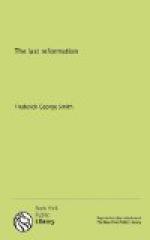[Sidenote: Lack of religious freedom]
This assumed corporate power of the clergy has been one of the fundamental causes of sect-making. When a general clerical body assumes the right in its corporate capacity to prescribe rules of either faith or practise, written or unwritten, and then to enforce them by judicial action, it is a direct violation of the New Testament standard, and of the rights of individual consciences. It was because of this lordly, unscriptural rule that many sincere men of God have been forced to sever their connection with the older sects in order to find a place where a greater degree of light and truth could be experienced and proclaimed. In such cases it was not religious liberty that caused the formation of new movements and new sects, but the lack of religious liberty.
That “power of the keys,” making and then enforcing the standards of creeds, has done violence to the conscience of both the clergy and the laity. Conscienceless persons subscribe to the creed without any particular hesitation, but the truly conscientious suffer the greatest embarrassment They must either refuse altogether and withdraw from all connection, or else subscribe with a mental reservation amounting practically to hypocrisy.
[Sidenote: Inflexible character]
This inflexible character of the sect institution has been a most fruitful cause for the production of new sects. No matter how spiritual the movement at its beginning, when its leaders were not longing for church power but were earnestly preaching the Word of the Lord as it came unto them, as soon as the sect machinery was thoroughly organized and was set in motion the inevitable tendency has been to throw around the movement a wall of creedal and ecclesiastical exclusiveness which shut out other true people of God; and then began a process of crystalization which ever afterwards precluded the unfolding of new truth. It is a well-known fact that the high tide of truth-discovery in every religious movement in Protestantism has been at the time of its beginning. A fixed law of immobility has ever afterwards prevailed. The reason is clear: whenever men grasp the reins of government and assume those prerogatives which belong to God alone, the rule of the Spirit ends. The unfolding of new truths by the operation of the Spirit is impossible within the limits of the old order where human ecclesiasticism reigns. But truth can not be permanently suppressed. If it can not find room for development within the existing order of things, God will raise up men who will, independently, proclaim the Word of the Lord. This he has done repeatedly, only to have the new movements end in the same manner—in a rule of human ecclesiasticism.




